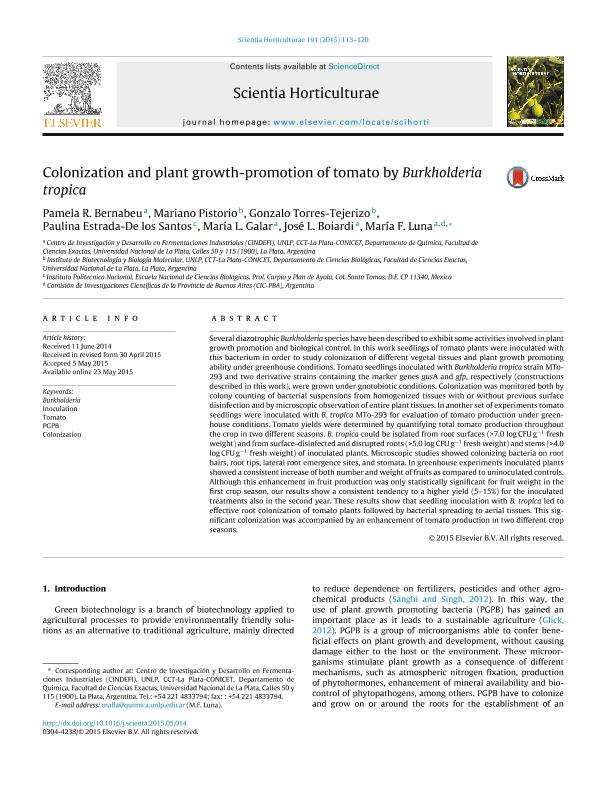Artículo
Colonization and plant growth-promotion of tomato by Burkholderia tropica
Bernabeu, Pamela Romina ; Pistorio, Mariano
; Pistorio, Mariano ; Torres Tejerizo, Gonzalo Arturo
; Torres Tejerizo, Gonzalo Arturo ; Estrada De los Santos, Paulina; Galar, Maria Lina
; Estrada De los Santos, Paulina; Galar, Maria Lina ; Boiardi, Jose Luis
; Boiardi, Jose Luis ; Luna, Maria Flavia
; Luna, Maria Flavia
 ; Pistorio, Mariano
; Pistorio, Mariano ; Torres Tejerizo, Gonzalo Arturo
; Torres Tejerizo, Gonzalo Arturo ; Estrada De los Santos, Paulina; Galar, Maria Lina
; Estrada De los Santos, Paulina; Galar, Maria Lina ; Boiardi, Jose Luis
; Boiardi, Jose Luis ; Luna, Maria Flavia
; Luna, Maria Flavia
Fecha de publicación:
08/2015
Editorial:
Elsevier Science
Revista:
Scientia Horticulturae
ISSN:
0304-4238
Idioma:
Inglés
Tipo de recurso:
Artículo publicado
Clasificación temática:
Resumen
Several diazotrophic Burkholderia species have been described to exhibit some activities involved in plant growth promotion and biological control. In this work seedlings of tomato plants were inoculated with this bacterium in order to study colonization of different vegetal tissues and plant growth promoting ability under greenhouse conditions. Tomato seedlings inoculated with Burkholderia tropica strain MTo-293 and two derivative strains containing the marker genes gusA and gfp, respectively (constructions described in this work), were grown under gnotobiotic conditions. Colonization was monitored both by colony counting of bacterial suspensions from homogenized tissues with or without previous surface disinfection and by microscopic observation of entire plant tissues. In another set of experiments tomato seedlings were inoculated with B. tropica MTo-293 for evaluation of tomato production under greenhouse conditions. Tomato yields were determined by quantifying total tomato production throughout the crop in two different seasons. B. tropica could be isolated from root surfaces (>7.0 log CFU g−1 fresh weight) and from surface-disinfected and disrupted roots (>5.0 log CFU g−1 fresh weight) and stems (>4.0 log CFU g−1 fresh weight) of inoculated plants. Microscopic studies showed colonizing bacteria on root hairs, root tips, lateral root emergence sites, and stomata. In greenhouse experiments inoculated plants showed a consistent increase of both number and weight of fruits as compared to uninoculated controls. Although this enhancement in fruit production was only statistically significant for fruit weight in the first crop season, our results show a consistent tendency to a higher yield (5–15%) for the inoculated treatments also in the second year. These results show that seedling inoculation with B. tropica led to effective root colonization of tomato plants followed by bacterial spreading to aerial tissues. This significant colonization was accompanied by an enhancement of tomato production in two different crop seasons.
Palabras clave:
Burkholderia
,
Inoculation
,
Tomato
,
Colonization
,
Pgpb
Archivos asociados
Licencia
Identificadores
Colecciones
Articulos(CINDEFI)
Articulos de CENT.DE INV EN FERMENTACIONES INDUSTRIALES (I)
Articulos de CENT.DE INV EN FERMENTACIONES INDUSTRIALES (I)
Articulos(IBBM)
Articulos de INST.DE BIOTECNOLOGIA Y BIOLOGIA MOLECULAR
Articulos de INST.DE BIOTECNOLOGIA Y BIOLOGIA MOLECULAR
Citación
Bernabeu, Pamela Romina; Pistorio, Mariano; Torres Tejerizo, Gonzalo Arturo; Estrada De los Santos, Paulina; Galar, Maria Lina; et al.; Colonization and plant growth-promotion of tomato by Burkholderia tropica; Elsevier Science; Scientia Horticulturae; 191; 8-2015; 113-120
Compartir
Altmétricas



